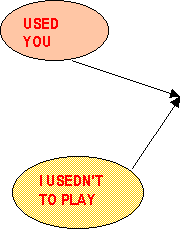grammar index home bat -1 bat-2 general can/may
must/need/have to should used to
must, need, have to, should (1)
must-should-have to-need (2) new-03-04
modal verbs- can, may, must, need new-03-04
All modal verbs have some special characteristics you should remember:
1. they do not take an -S in the third person singular: you cannot say
he
cans or she
wills.
2. they are followed by an infinitive without 'to' in most cases.
BUT:
NEED takes 'to' when expressing absence of obligation in the negative:
Ex: You do not need to stay if you don't want to.
OUGHT TO is a special case and you must learn it like that. It expresses convenience.
Ex: You ought to study more more if you want to pass the exam.
3. Also in most cases they function like the verb to be for questions and negatives:
ex: Can you speak louder, please ? No, I cannot speak louder.
![]() BUT
BUT
You DON'T NEED TO speak louder to express absence of obligation
![]() You
DON'T HAVE TO
You
DON'T HAVE TO
4. Also in most cases they do not have a past form of their own, so we need different forms like BE ABLE TO: I will be able to speak French in
two months or BE ALLOWED TO : You will be allowed to go out as soon as you are eighteen. However
CAN ---------------------- COULD
Or
MAY----------------------------- MIGHT
However, past tenses in modal verbs normally mean more than just time.
- COULD is more polite than CAN and can also be used for the present and
- MIGHT is less probable than MAY.
5. Sometimes modal verbs can also be followed by a perfect infinitive.
Ex: it MUST HAVE BEEN the rain, which talks about the past.
"Debió ser la lluvia".
USO DE LOS VERBOS MODALES MAS FRECUENTES.
|
Valor expresivo |
presente |
pasado |
futuro |
|
capacidad |
She can speak English
|
She could understand Chinese, but now she can't (general ) We WERE ABLE TO jump the hurdle(specific) |
You will be able to speak
French. |
|
Permiso peticiones |
Can you pass me the salt ? Could you pass me the salt ? May I go out ? Yes, you may/may not |
I couldn't leave the class . I wasn't allowed to leave the class. They didn't allow me to leave the class |
You won't be allowed to drink in the army. They won't allow you to drink in the army |
|
posibilidad |
What can that be ? What could that be? That may be the rain |
It may have been the rain. It can have been the rain It could have been the rain |
|
|
Valor expresivo |
presente |
pasado |
futuro |
|
Obligación prohibición |
You must sit correctly You mustn't speak loud You need to start again.
|
She had to be home early. You were not allowed to
get late. |
You must be here tomorrow at ten o'clock You will have to eat everything at school. You won't be allowed to smoke there. |
|
Ausencia de obligación |
You needn't do it if you don't want to You don't have to do it You don't need to do it |
You didn't need to do it. You didn't have to do it You needn't have done it |
You won't need to spend money in the army. They won't have to pay for the drinks in the party |
|
deducción |
That must be John coming (afirmativa) That can't be John (neg) |
That must have been John That can't have been John |
|
- they are used to express 'convenience'
ex: you should/ought to study more: deberías estudiar más.
- ought to in the interrogative looks peculiar but works a s a modal anyway.
Ought he to stay in bed or go out already ?
USE
OF MIGHT
-
it can appear in the same contexts as MAY but it expresses less probability: it
might rain tomorrow is less probable than it may rain tomorrow
- might as well… is used to express the idea of 'it makes no difference', like when we say in Spanish 'lo mismo…..
ex: 'I might as well walk home…(Sp: 'lo mismo voy andando a casa)
It can function as a
1. as a modal verb:

to play in this area of the school ?
2. as a full verb

in that area of the school.
In this case DID auxiliary is used